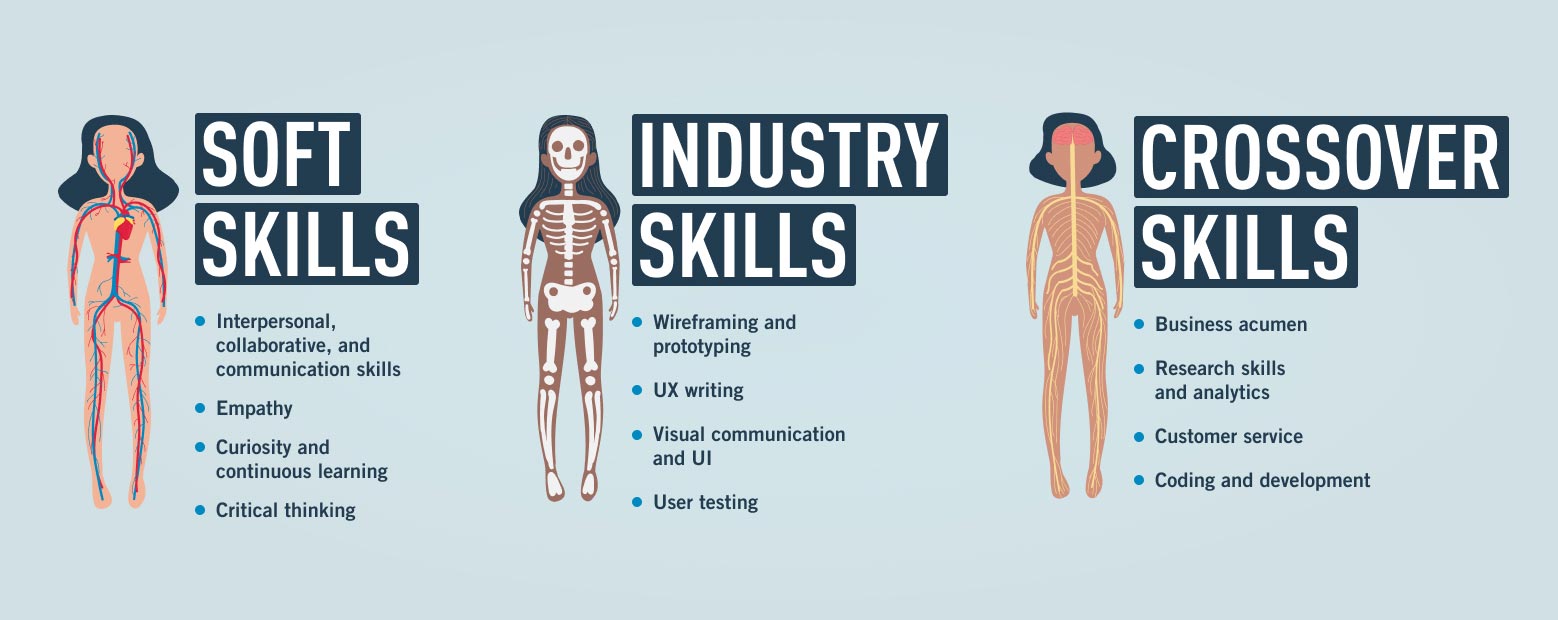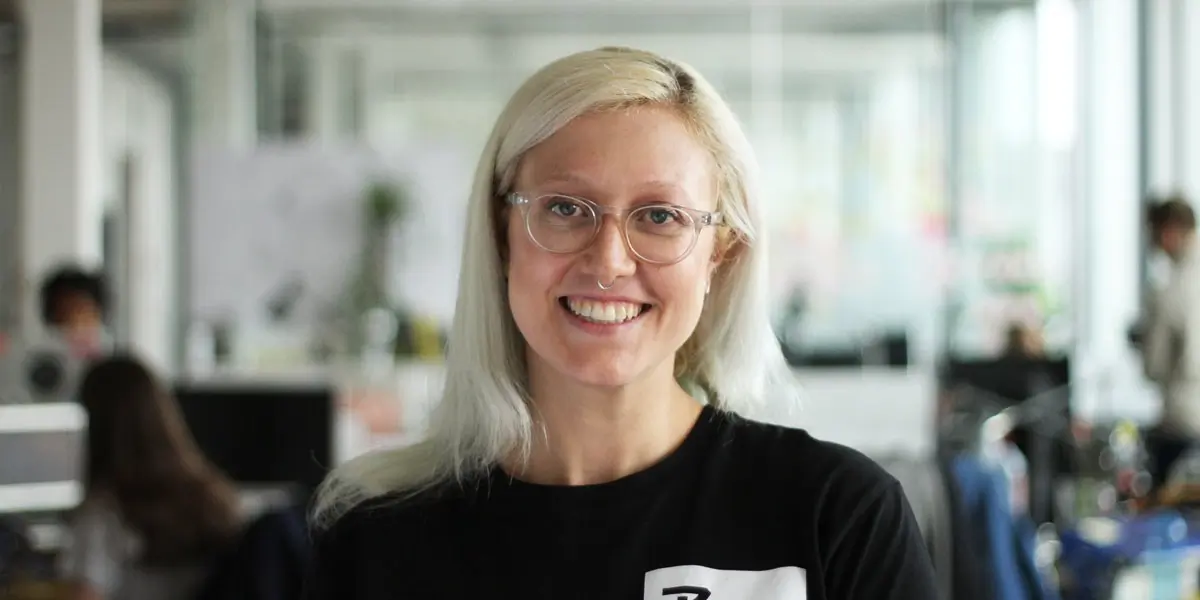Before you quit your day job and invest in a UX design course, you might be wondering: Is UX design a good career?
If you’re after a competitive salary, demand for your skills, and a varied, interesting career, the answer is a resounding yes.
In this post, we’ll take a look at the state of UX design in 2025, whether it’s the right career for you and your goals, and then see whether your profile is a good fit for UX design. Of course, you can dive right in with our free short course.
Let’s dive in.
1. Is UX design a good career?
Demand for UX designers
In the face of AI and tech layoffs, you’ll be forgiven for wondering if UX design is a reliable career to embark on this year.
But for those interested in jumping into the field, the outcome is undeniably good. As the benefits of UX design to a business’s bottom line become increasingly apparent, the demand for UX designers is only on the rise.
With the new need for UX specialists to inform the use of AI tools and the importance of UX design in the explosive gaming industry, there’s no limit in sight.
Glassdoor added it to their list of best 50 jobs to have in 2022 and CNN Money predicts the demand for UX designers to grow by 13% from 2017-2027.
Even more recently, Indeed added it to their list of 19 IT jobs that are in demand.
Salary
Average UX design salary: $93,046
A UX designer’s salary, like any role, depends on your experience level, which company you work for, where you live, and any number of other considerations, even at-the-interview negotiations.
The TL;DR is that the salary is highly competitive, far exceeds the national average of $53,490 per year, and the UX design role makes regular appearances in “highest-paying entry-level jobs” lists.
For more information on what salary you might earn as a UX designer, have a look at our UX designer salary guide.
Job satisfaction and variety
There aren’t too many jobs out there that combine both creativity and analytical thinking. If you want a career that incorporates both, UX design is the ideal meeting point.
CareerFoundry graduate and UX designer Lacey is a perfect example of why it’s such an ideal subject area. While experience working as a hypnotherapist with a degree in math might not sound like a “typical” background, she soon realized that UX was the perfect intersection of design and psychology—and she thrived.
On the one hand, you’ll need to conduct user research and analyze the results, identifying trends and patterns in the data. At the same time, you’ll need to be creative when it comes to generating ideas, collaborating with UI designers on visual aspects, and coming up with solutions to problems.
Within the UX design umbrella, there’s so much you can do. From video games to mobile apps, from virtual reality to voice design, there are countless paths you could end up on.
Increasingly, UX designers are expected to have specialized knowledge in areas such as voice design, user research, frontend development, and UX writing. If you don’t want to be tied to one set field and you like the idea of branching out, a career in UX design is full of opportunity.
Remote work
Remote work is on the rise, and UX design is one of the most popular roles for this new work approach.
Research by MarketsandMarkets shows that the remote workplace services market size is expected to increase from USD 20.1 billion in 2022 to 58.5 billion by 2027
If you dream of working remotely and becoming a so-called digital nomad, or even working for yourself, UX design is one career where this is not only completely possible but also fairly common.
To find out more about remote UX design, read up on how to become a remote UX designer.
Impact
As a UX designer, you’ll be doing meaningful work. How? Well, you’re shaping the world around you and influencing—and improving—how people experience it. Not only that: design has a direct impact on business outcomes, with design-driven companies outperforming their competitors.
As the world of UX sets its focus on inclusive design, more companies and design teams are looking for ways to create products and experiences that are more inclusive than ever, and this has a direct impact on users who are often excluded based on their abilities, race, gender, identity, or background.
UX designers have the power to create a world that works better for users along the full spectrum of humanity! Learn more about inclusive design in our beginners’ guide.
3. Is UX design a good career for me?
While anyone can pursue a career in UX, not everyone would necessarily feel at home in this field. When considering whether this is the right path for you, remember that the skillset of a great UX designer is incredibly broad. You need to think about your inherent characteristics, your natural talents, and what motivates you on a daily basis.
A great UX designer has an incredibly broad skill set that encompasses a variety of soft skills, industry skills, and crossover skills.
- Soft skills include things like interpersonal, collaborative, and communication skills, along with empathy, curiosity, and critical thinking. These are often skills that are difficult to teach, but that you’ve likely naturally developed in other work experiences and almost always benefit from continuous cultivation. We’ve seen people from many different backgrounds successfully start careers in UX, and that success starts with soft and transferable skills. So if you’re coming from a career in marketing, graphics design, dance, or teaching, it’s definitely possible to become a UX designer!
- Industry skills are the ones that you can learn, often through a UX design program or bootcamp: user research, UX writing, wireframing, prototyping, and more.
- Crossover skills will take you time and effort to learn, but if you keep an open and curious mind in every kind of work you do, it makes this development easier. These skills include things like business acumen, research, analytics, customer service, coding, and web development.
Here’s a visual breakdown of what the core UX design skillset looks like:

Here are some telltale signs that you’re a good fit for a career in UX design:
1. You put people first
Maybe you work in customer service and live by the motto that the customer is always right. Perhaps you just enjoy being around people and finding out what makes them tick. If you have a natural gift for empathy, you’ll likely enjoy many aspects of UX design, such as user research, creating personas, and gathering product feedback. UX design is all about understanding the user’s needs and putting them first. If you consider yourself a “people person,” you’re definitely off to a good start.
2. You’re interested in technology
UX designers are highly skilled at bridging the gap between technology and people. As Fred Beecher, Director of UX at The Nerdery explains, he is responsible for “humanizing technology.” Essentially, UX designers make sure that all the latest gadgets are easy for humans to use—be it the newest iPhone, the Amazon Alexa voice assistant, or a native mobile app. You don’t need to be a tech wizard to be a good UX designer, but if you do happen to be passionate about the latest trends and devices, a job in UX will put you right in the thick of it.
3. You thrive on variety
If you thrive on variety, you’ll definitely feel at home in UX design. It’s such a multidisciplinary field, comprising elements of design, human psychology, problem-solving and business. One day you could be interviewing users, the next you might be writing microcopy, creating website or app wireframes, or presenting your designs to developers. You’ll rarely be stuck at your desk doing the same task over and over, so you need to be comfortable wearing many hats and navigating an extremely varied to-do list.
4. You enjoy problem-solving
Problem-solving is at the very heart of UX design. First and foremost, you are designing to solve a specific user problem—but even within this process, there are additional layers of problem-solving. How do you create the optimal product within the given time and budget constraints, and how do you design for the user while fulfilling the business objectives? If you’re a problem-solver by nature, you’ll have plenty to offer in a UX design role.
5. You’re a good collaborator
UX design is not a solitary role. It’s a highly collaborative field, requiring clear communication and solid teamwork. At every stage of the process, UX designers need to collaborate with their peers; whether it’s conducting user research, aligning with stakeholders or handing over to developers. If you enjoy working with others and are confident when it comes to presenting your ideas, you should have no problem with this aspect of the job.
6. You’re prepared for a steep learning curve
One of the great things about UX design is that there’s so much to learn and explore that it never gets boring. If you are brand new to the field, you should be prepared for a steep learning curve—but as long as you’re passionate, it won’t feel like a chore. Even once you’ve mastered the fundamentals, you’ll need to constantly upskill in order to succeed. If you’re a keen learner and always want to better yourself, UX is a field that will push you to do so.
7. You’re a stickler for detail
If you’ve got a good eye for detail, you’ll be right at home in UX. When designing for the user, it’s important to think about every single tiny detail—not just aesthetically, but in terms of functionality too. The overall user experience is made up of so many different elements, and these all need to be considered. You’ll also need to revise and refine your designs until they are market-ready, so an eye for detail and a tendency toward perfectionism will go a long way.
3. Key takeaways and next steps
Now that you’ve got a better idea of whether or not you and UX design would be a good match, it’s time to start exploring. Start by reading some great books about design thinking, and taking a free introductory short course in UX design.
Or, go ahead and speak directly with a UX design program advisor.
If you think this might be the career for you, here are some other articles you’ll find useful:
